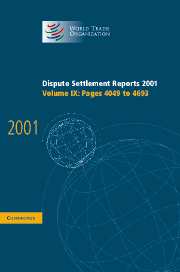Report of the Appellate Body
from United States - Safeguard Measures on Imports of Fresh, Chilled or Frozen Lamb Meat from New Zealand and Australia (WT/DS177, WT/DS178)
Published online by Cambridge University Press: 13 December 2017
Summary
INTRODUCTION
The United States, Australia and New Zealand appeal certain issues of law and legal interpretations in the Panel Report, United States - Safeguard Measures on Imports of Fresh, Chilled or Frozen Lamb Meat from New Zealand and Australia (the “Panel Report”). The Panel was established to consider complaints by Australia and New Zealand with respect to a definitive safeguard measure imposed by the United States on imports of fresh, chilled and frozen lamb meat.
On 7 October 1998, the United States International Trade Commission (the “USITC”) initiated a safeguard investigation into imports of lamb meat. By Proclamation of the President of the United States, dated 7 July 1999, the United States imposed a definitive safeguard measure, in the form of a tariff-rate quota, on imports of fresh, chilled and frozen lamb meat, effective as of 22 July 1999. The factual aspects of this dispute are set out in greater detail in the Panel Report.
The Panel considered claims by Australia and New Zealand that, in imposing the safeguard measure on imports of lamb meat, the United States acted inconsistently with Articles I, II, and XIX of the General Agreement on Tariffs and Trade 1994 (the “GATT 1994”), and with Articles 2, 3, 4, 5, 8, 11, and 12 of the Agreement on Safeguards.
In its Report, circulated to Members of the World Trade Organization (the “WTO”) on 21 December 2000, the Panel concluded:
a) that the United States has acted inconsistently with Article XIX:1(a) of GATT 1994 by failing to demonstrate as a matter of fact the existence of “unforeseen developments”;
(b) that the United States has acted inconsistently with Article 4.1(c) of the Agreement on Safeguards because the USITC, in the lamb meat investigation, defined the domestic industry as including input producers (i.e., growers and feeders of live lamb) as producers of the like product at issue (i.e. lamb meat);
(c) that the complainants failed to establish that the USITC's analytical approach to determining the existence of a threat of serious injury, in particular with respect to the prospective analysis and the time-period used, is inconsistent with Article 4.1(b) of the Agreement on Safeguards (assuming arguendo that the USITC's industry definition was consistent with the Agreement on Safeguards);
- Type
- Chapter
- Information
- Dispute Settlement Reports 2001 , pp. 4051 - 4106Publisher: Cambridge University PressPrint publication year: 2004

